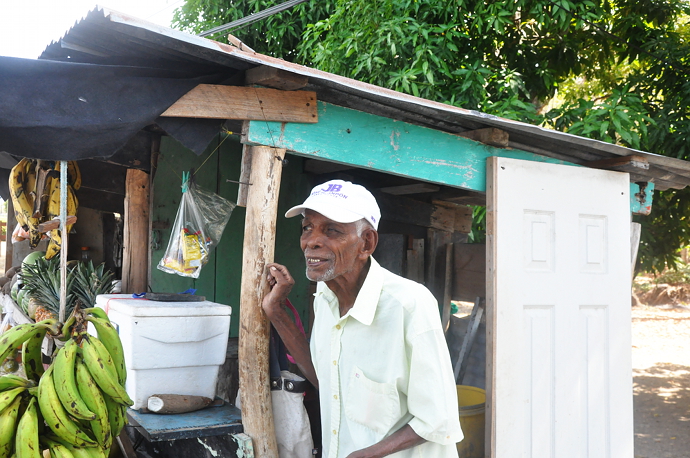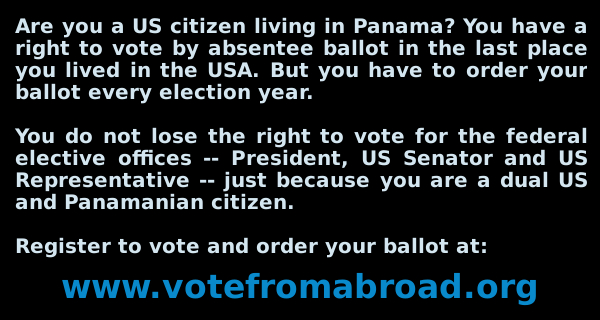Antonio Barrios, who would probably have some sort of inadequate pension and who has family in the community, and with his loyal dog Fulo laying nearby in the shade to stand guard, keeps HIS business in Las Uvas de San Carlos open during the pandemic. Photo by Eric Jackson.
Nearly half of Panama’s working people, a majority of businesspeople, but not counted
by Eric Jackson
What to do about the informal economy? Precisely none of the Cortizo cabinet’s coronavirus emergency decrees and proposals address the situations of the more than 40 percent of Panama’s working population who fend for themselves without lawyers, CPAs, enough income to trigger the need to keep books or pay income taxes or coverage by Seguro Social. For these folks, the choice when sick may be to go out on the street and sell or starve, which presents a major public health issue.
When counting who is employed and who is not, the government likes to count informal workers as “employed” so as to keep unemployment figures in a country with no real unemployment insurance system at a rate that looks acceptable. Never, in any of the boards or commissions or political party organizations, are these people represented or considered.
Come election time their votes may be purchased — so politicians hope — with a T-shirt or a baseball hat or some building materials or a bag of groceries. The votes do count, and the purchase of votes, which is illegal, usually with public resources, which is much more illegal, never gets punished.
Do we want to look at it from the business perspective? The informal micro-entrepreneurs are the vast majority of people who own and run businesses in Panama. The rabiblanco businesses discount them because the do not have a RUC, unique business tax number. Also pretty much excluded — or shall we say segregated? — by those who pretend to represent Panamanian business are the small, sometimes larger than small, Chinese family retail businesses. The high and mighty and their businesses are outnumbered by the mini-supers.
Come election time, there are local politicians who are regular customers or friends, or who will offer something or threaten something, to get their signs at the mini-super. Usually they have to know and navigate the ways of Confucian political ethic, even if the proprietors may be generations removed from China. And then there are the political parties, most especially the PRD, who deal with the Chinese merchants not so much as businesspeople but as the Chinese community. The PRD has long reminded Chinese-Panamanians of who Arnulfo Arias stripped Chinese-Panamanians of their citizenship, even if they, their parents and their grandparents were born here. But that was 1941. Times and political alignments have changed a bit in that time.
Yes, it will be easy for Nito and his ministers to dismiss the micro-entrepreneurs as unorganized and unorganizable. Those who are very rich because of hard labor — other people’s — may call them “unemployable” because THEY don’t and probably wouldn’t employ them. But consider what it would mean if in some small community the family that runs the only mini-super gets quarantined. Consider what it would mean if someone who needs to go out and sell to have money to buy food is ordered to stay at home and this order is enforced by the police. Consider what it would mean if people who are sick and contagious are out on the streets working because otherwise they can’t live.
Just because nobody who lives that way, or has lived that way, sits around the cabinet table does not make the situations go away. The informal economy is, directly, hundreds of thousands of PANAMANIANS, even if the screed is to dismiss everyone in it as foreigners without work permits. The foreigners involved are, albeit a small minority, enough to make a little critical mass of contagion if they are ruled out of the public health equation and driven underground.
So what about US, those who outnumber those who “count?” Business loans and tax breaks for those with RUCs and pale faces barely begin to meet our needs, even if it is true that others left totally destitute buy fewer bananas and can’t donate to keep independent journalism going.
This health crisis is an even worse economic crisis for Panama. It’s going to last for months, probably with the economic crisis lingering longer than the health issue. The government will need to address situations and needs that so far it has not.
Contact us by email at fund4thepanamanews@gmail.com
To fend off hackers, organized trolls and other online vandalism, our website comments feature is switched off. Instead, come to our Facebook page to join in the discussion.
These links are interactive — click on the boxes












